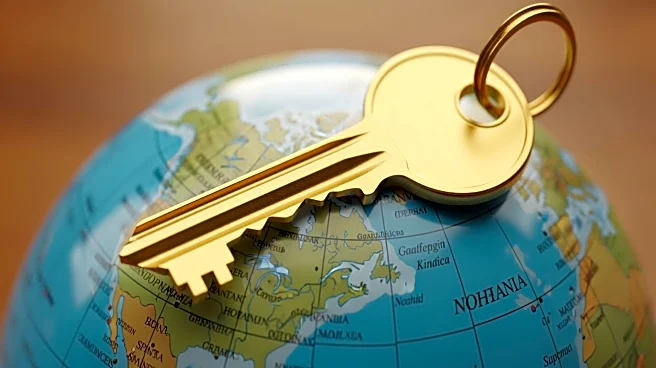What's Happening?
President Trump is playing a pivotal role in the ongoing Israeli-Palestinian conflict, with recent developments highlighting his influence in the region. At a world leaders' summit in Sharm el-Sheikh,
Egypt, President Trump and Saudi Arabia's Foreign Minister Prince Faisal bin Farhan Al-Saud were seen shaking hands, symbolizing a significant diplomatic effort. The summit focused on ending the Gaza war, with the U.S. brokering a prisoner-hostage swap and a ceasefire deal between Israel and Hamas. This marks a notable shift in the geopolitical landscape, with President Trump actively involved in negotiations aimed at stabilizing the region.
Why It's Important?
The involvement of President Trump in the Middle East peace process is significant for several reasons. Firstly, it underscores the U.S.'s continued influence in global diplomatic affairs, particularly in volatile regions like the Middle East. The ceasefire and prisoner-hostage swap could lead to a reduction in hostilities, potentially paving the way for more comprehensive peace talks. This development may also impact U.S. relations with key regional players, including Saudi Arabia and Israel, and could influence future U.S. foreign policy decisions. The success of these negotiations could enhance President Trump's legacy in international diplomacy.
What's Next?
Following the ceasefire agreement, the next steps may involve further diplomatic engagements to ensure the stability of the truce. Stakeholders, including the U.S., Israel, and Hamas, will likely continue discussions to address underlying issues and prevent future conflicts. The international community may also play a role in supporting peace efforts, potentially leading to broader negotiations involving other regional actors. Monitoring the implementation of the ceasefire and the prisoner-hostage swap will be crucial in maintaining peace and preventing escalation.
Beyond the Headlines
The ceasefire deal brokered by President Trump could have deeper implications for the Middle East's geopolitical dynamics. It may influence the balance of power in the region, affecting alliances and rivalries. Additionally, the deal could impact humanitarian conditions in Gaza, potentially improving the lives of civilians affected by the conflict. The ethical dimensions of negotiating with groups like Hamas may also be scrutinized, raising questions about the long-term viability of such agreements.










